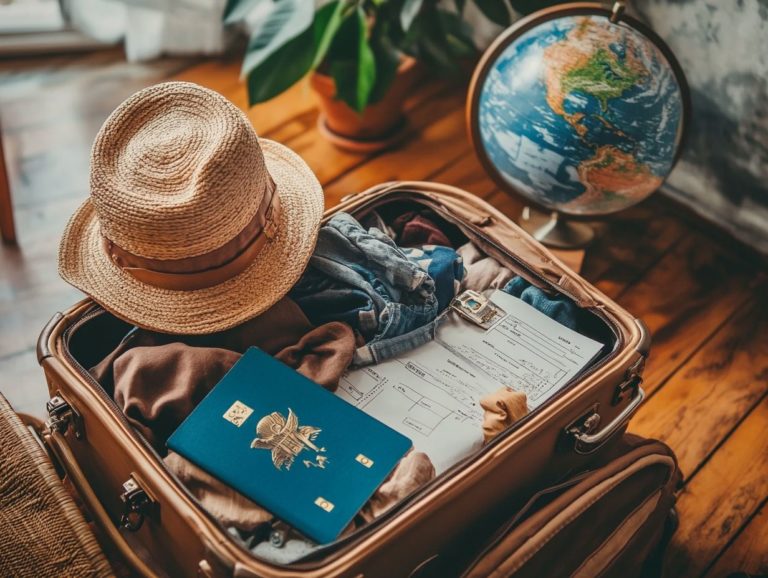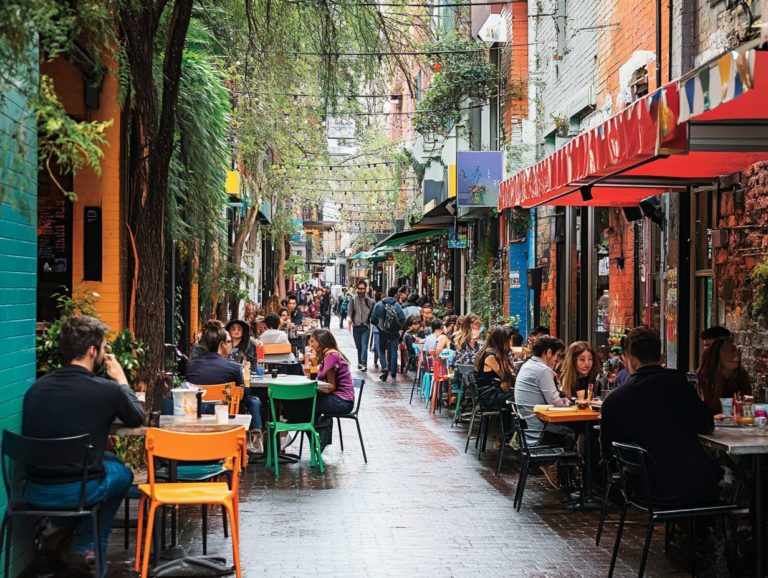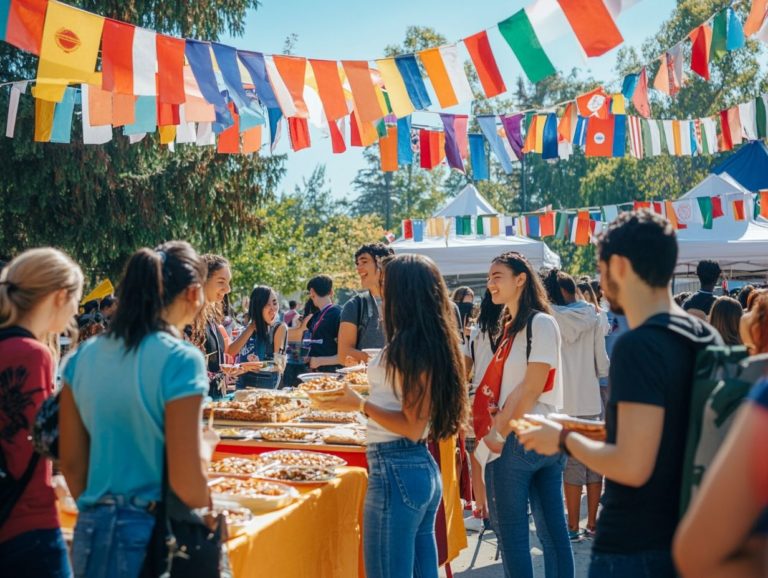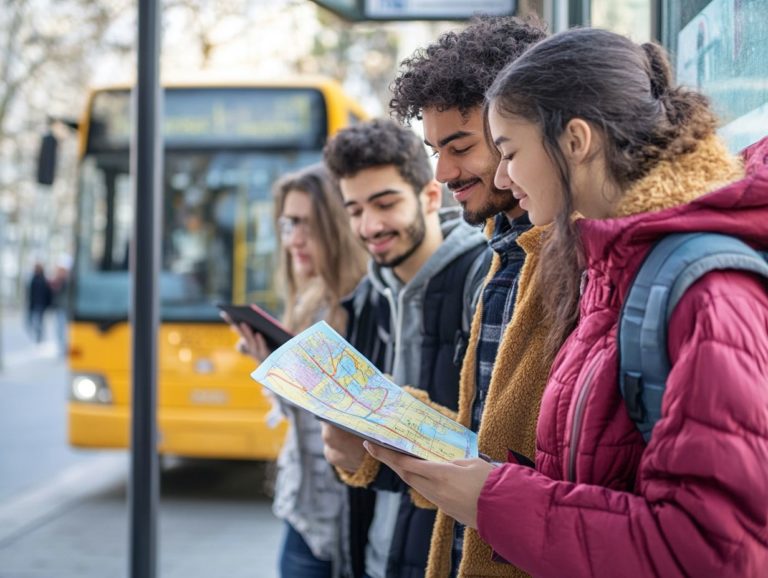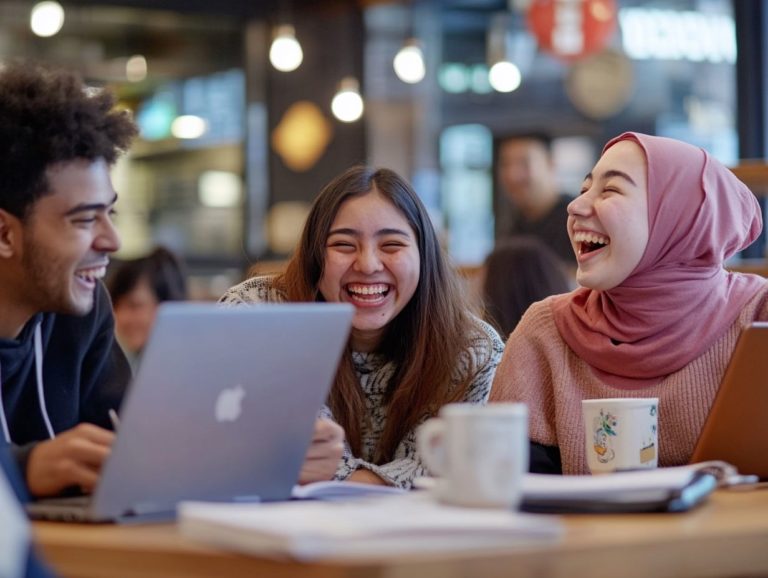How to Adapt Your Study Techniques Abroad
Studying abroad is an exhilarating journey that presents a wealth of cultural experiences and opportunities for academic growth! Starting this exciting journey demands thoughtful planning and a willingness to adapt. This guide outlines essential steps, including researching your destination, navigating financial considerations, understanding cultural differences, and crafting effective study strategies tailored to your unique learning style.
It also covers common challenges like language barriers and homesickness, equipping you with the necessary tools to ensure a successful overseas study experience.
Contents
- Key Takeaways:
- Preparing for Studying Abroad
- Adapting Your Study Techniques
- Navigating Language Barriers
- Managing Homesickness and Culture Shock
- Frequently Asked Questions
- 1. How can I adapt my study techniques when studying abroad?
- 2. Will I be able to use the same study techniques I use at home?
- 3. How can I make the most of my study abroad experience?
- 4. What are some common study techniques used abroad?
- 5. How can I maintain my study routine while abroad?
- 6. Is it okay to ask for help with my study techniques while abroad?
Key Takeaways:
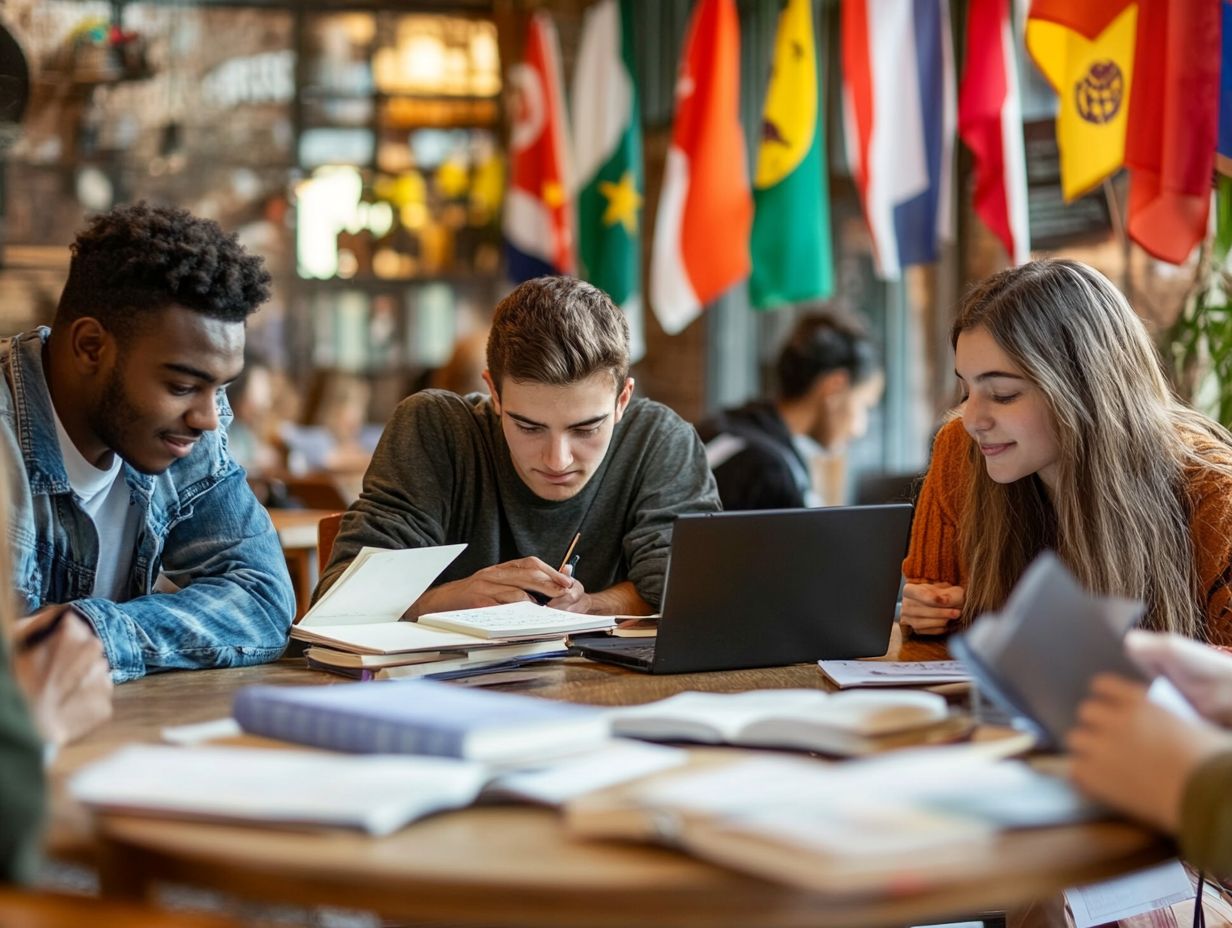
- Research your destination before studying abroad to better understand the culture and prepare financially and administratively.
- Adapt your study techniques by understanding cultural differences and using effective strategies for different learning styles.
- Overcome language barriers by actively practicing and immersing yourself in the new language, and seek support for managing homesickness and culture shock.
Why Study Abroad?
Studying abroad opens up a world of unique opportunities for personal development and cultural exploration! It allows you to fully immerse yourself in diverse environments, engage with local customs, and build emotional support networks.
This experience can significantly enhance your global awareness, which means understanding different cultures and perspectives around the world. It offers a platform for a deeper understanding of cultural diversity and the academic expectations that come with a different context an essential aspect of any international student s journey.
By stepping outside your comfort zone, you gain invaluable insights that go far beyond classroom learning. The friendships you form during this time often blossom into lifelong connections, bridging cultures and creating a robust support system that fosters resilience.
Engaging with diverse perspectives enriches your academic experiences, honing your critical thinking and adaptability. The balance of challenges and rewards you encounter while navigating a new cultural landscape strengthens your emotional resilience and cultivates a broader worldview, equipping you with the tools necessary to thrive in our increasingly interconnected global society.
Preparing for Studying Abroad
Preparing for your journey to study abroad requires careful research on your host country. You need to grasp the financial aspects and tackle essential administrative tasks to ensure a smooth transition into your new environment.
Researching Your Destination
Thoroughly researching your destination is essential for grasping the local customs, cultural etiquette, and lifestyle in your host country. This preparation not only smooths your cultural adjustment but also elevates your study abroad experience.
By immersing yourself in the subtleties of the local culture, you can sidestep any unintentional cultural mistakes that might arise from being unaware. Engaging with travel guides and online resources offers invaluable insights into accepted behaviors think appropriate greetings, dining etiquette, and social norms.
Connecting with locals and participating in community events provides firsthand experiences that deepen your cultural appreciation. This proactive approach fosters respect and openness, giving you the power to form genuine connections and navigate your surroundings with confidence, ultimately transforming your journey into a more enriching adventure.
Financial and Administrative Considerations
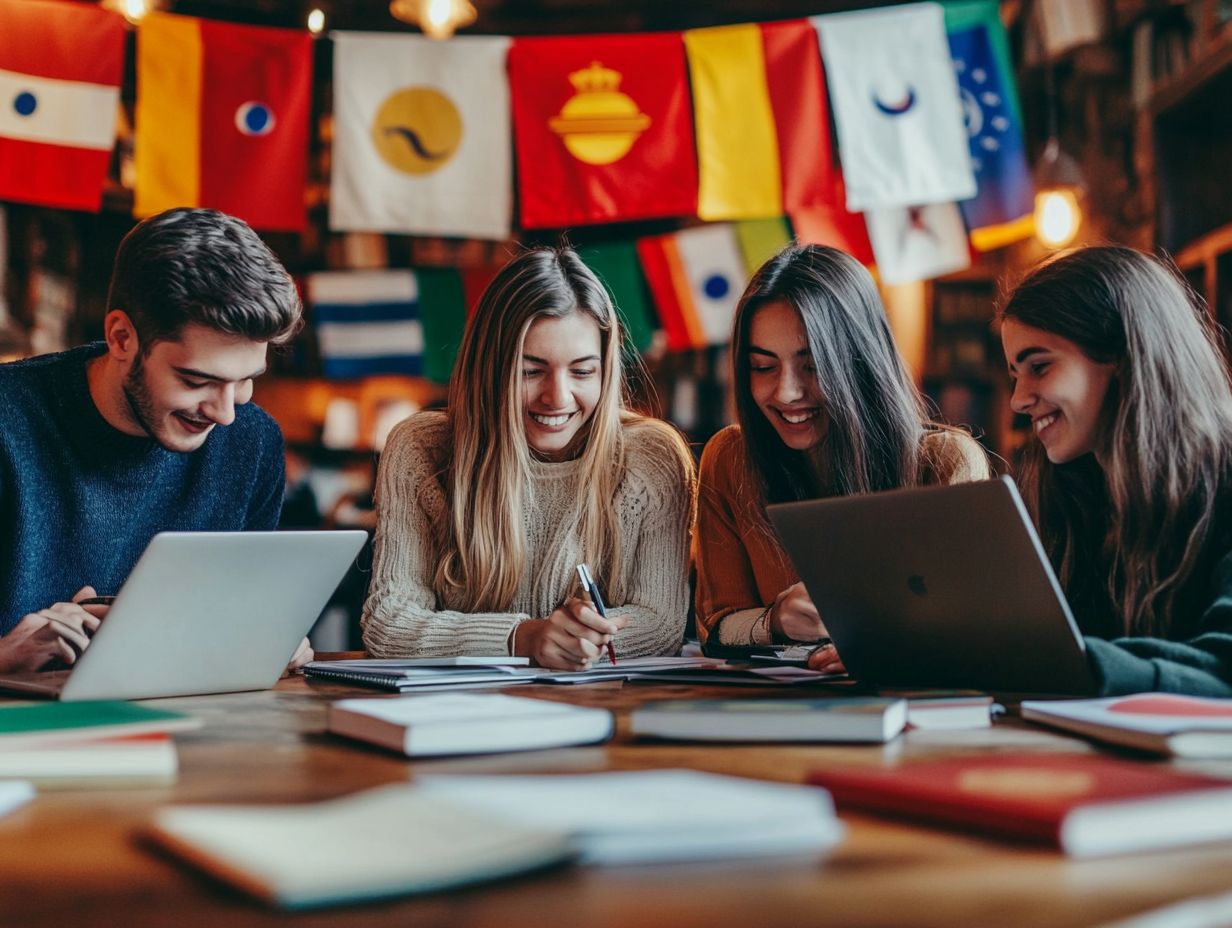
Addressing financial and administrative considerations is crucial for you as an international student. Budgeting for living expenses and handling necessary administrative tasks can significantly shape your overall study abroad experience.
Thoughtful planning helps you manage your finances without the weight of undue stress. This means crafting a realistic budget that encompasses daily necessities such as local food, transportation, and accommodation costs.
Get to know your university requirements and the visa application process. This will ease your journey through different paperwork. Utilizing the support resources offered by your institution can greatly assist you in navigating both financial and bureaucratic landscapes (the rules and processes you need to follow), helping you settle into your new environment with greater confidence and less anxiety.
Adapting Your Study Techniques
Adapting your study techniques to align with various academic expectations and cultural norms is essential for cultivating a successful educational journey in a foreign environment. To help with this, learning how to stay organized while studying abroad enhances your ability to adjust culturally and significantly boosts your academic performance.
Understanding Cultural Differences
Understanding cultural differences is essential for you as an international student, as it enriches your cultural sensitivity and promotes social integration, paving the way for meaningful experiences during your stay.
You often navigate a landscape shaped by various norms that dictate communication styles, social etiquette, and even dining practices. For instance, in some cultures, making direct eye contact is a sign of confidence and engagement, while in others, it may come off as disrespectful.
You might find yourself adapting to different group dynamics, such as the expectation to actively participate in class discussions versus a preference for individual reflection. Join student organizations now to make connections and dive into local culture!
These strategies not only foster connections but also help you understand local customs, ultimately enhancing your experience in a new environment.
Effective Study Strategies for Different Learning Styles
Developing effective study strategies tailored to your unique learning style is crucial for achieving academic success, especially during a study abroad experience where cultural immersion can significantly enhance your understanding and retention. To help maintain relationships during this time, consider exploring how to stay connected while studying abroad.
You ll often find that a mix of visual, auditory, and kinesthetic techniques not only caters to your individual preferences but also enriches the overall learning process. For example, engaging in group discussions can be particularly beneficial for auditory learners, while visual learners may find colorful mind maps that incorporate cultural elements to be a game-changer.
By immersing yourself in local customs and traditions, you foster social involvement that allows you to connect theoretical knowledge with real-world experiences. This combination of diverse study methods, alongside active participation in the community, creates a comprehensive educational environment that promotes a deeper understanding and embeds knowledge more firmly into your academic framework.
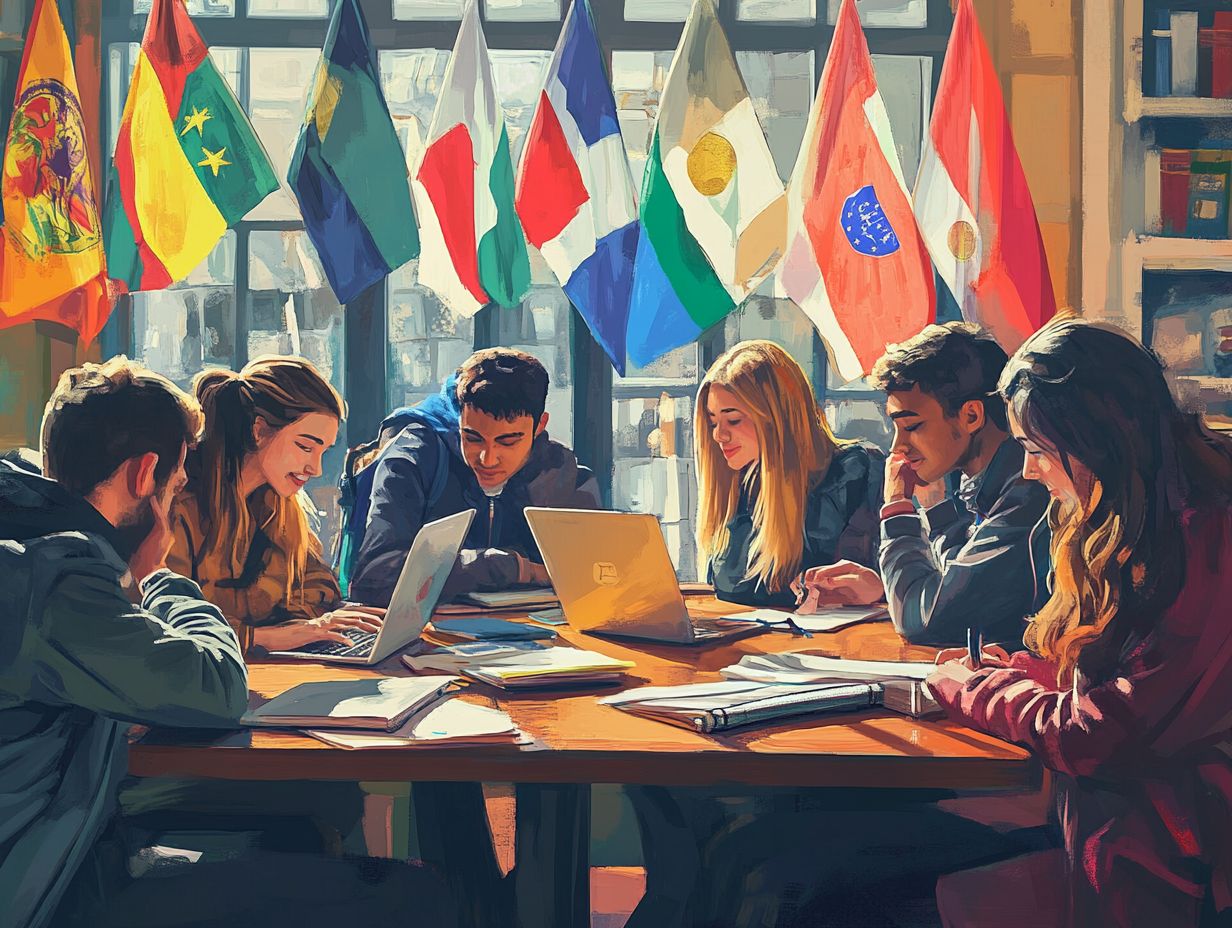
Navigating language barriers is an unavoidable challenge for many international students. Yet, employing effective language learning strategies and utilizing supportive resources can profoundly enrich your study abroad experience. It’s also wise to consider how to make a backup plan for study abroad to ensure a smooth journey and cultivate meaningful connections with locals.
Tips for Learning a New Language
Learning a new language can feel like an exhilarating rollercoaster ride, full of twists and turns. Yet, by employing practical strategies and immersing yourself in the local culture, you can significantly elevate your language acquisition experience.
Seize every opportunity for real-world interaction; it’s your ticket to building confidence and rapidly honing your skills. Engaging in conversations with locals not only offers immediate feedback but also allows you to practice authentically across various contexts.
Emotional support can be a game-changer! Don’t underestimate the value of emotional support from fellow learners or community groups. They create a nurturing atmosphere that makes the journey feel less daunting. Building strong support networks fosters a structured setting where you can share tips, celebrate milestones, and motivate one another, turning the challenge of learning a new language into an enriching shared adventure.
Managing Homesickness and Culture Shock
Managing homesickness and culture shock is crucial during your study abroad journey. As you navigate through the different stages of adjustment, recognize how these feelings can profoundly influence your emotional well-being and academic performance.
Coping Strategies and Support Systems
Implementing effective coping strategies and building strong support networks can significantly ease your feelings of homesickness and culture shock. This ultimately fosters a deeper cultural understanding and emotional resilience during your study abroad journey.
For many international students, embracing new environments can present unique challenges. However, exploring various community resources can truly transform your experience. Joining student organizations, participating in cultural exchange programs, or attending workshops tailored for newcomers helps you build valuable connections and enrich your understanding of local customs and traditions.
Help available for your feelings, like counseling services and mentorship programs, offers safe spaces for you to express your feelings and seek guidance. By actively engaging in the community and taking advantage of these support systems, you can navigate your experiences more effectively, cultivating a sense of belonging and enhancing your overall study abroad adventure.
Frequently Asked Questions

1. How can I adapt my study techniques when studying abroad?
Adapting your study techniques abroad requires planning and preparation. Start by researching the educational system and cultural norms of the country you will be studying in. This gives you an idea of what to expect and how to tailor your study techniques accordingly, including tips for effective study habits abroad.
2. Will I be able to use the same study techniques I use at home?
Possibly, but be open to trying new study techniques that may be more effective in your host country. For example, if group work is emphasized in your host country, be prepared to collaborate with your peers and adapt your individual study methods accordingly. You might also want to check out how to prepare for exams while abroad for additional tips.
3. How can I make the most of my study abroad experience?
One way to maximize your study abroad experience is to immerse yourself in the local culture. This can include attending local events, joining clubs or organizations, and learning how to handle academic pressure abroad by trying new study techniques that are commonly used by students in your host country.
4. What are some common study techniques used abroad?
Common study techniques vary by country. For example, in some Asian countries, rote memorization is prevalent, while in European countries, students may rely more on critical thinking and analysis. To further enhance your experience, consider learning how to balance study and social life overseas. Do your research and be open to trying new methods.
5. How can I maintain my study routine while abroad?
Maintaining a study routine while abroad can be challenging, but staying organized and managing your time effectively helps. To enhance your experience, consider following tips on how to make the most of your study abroad experience. Find a quiet and comfortable place to study, and schedule breaks and leisure activities to avoid burnout.
6. Is it okay to ask for help with my study techniques while abroad?
Absolutely! Don’t hesitate to reach out to your academic advisors or local students for advice on how to handle academic challenges abroad. They may have valuable insights and tips that can make your study abroad experience even more successful.

